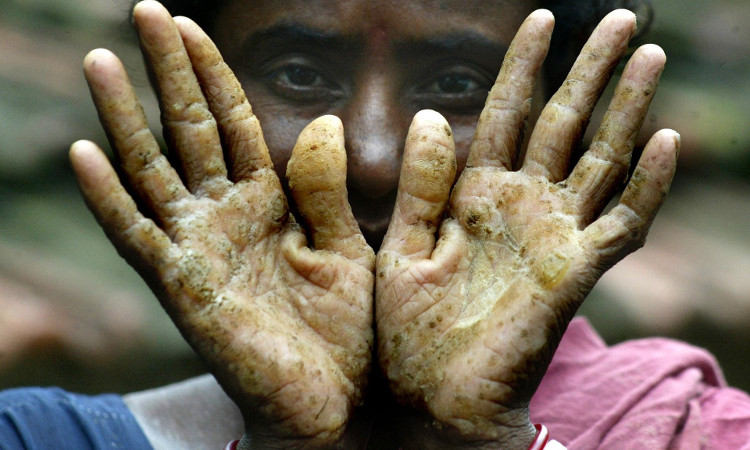The world is
People face many epidemics due to severe water pollution and extreme weather appear more and more dense.
Microbiologist Joan Rose, who won the world prestigious award in the field of clean water, is now engrossed in a mixed feeling of frustration and optimism about the process of treating water for people.

Water pollution causes serious diseases.
In May 2000, half of 5,000 people living in Walkerton, Canada fell ill with five deaths when cow manure mixed into well water. The pollution in the town is hidden, leaving people facing many dangers to destroy the body.
Biologist Joan Rose of the University of Michigan, who is very impressed with the serious water pollution outbreaks in the world, also shuddered at the bad situation at Walkerton.
"It was the biggest shock for me. Walkerton is a small agricultural area. The people here are very nice. But they have to suffer two diseases from the water supply. They do not know their children are getting weaker. "There is a risk of kidney failure, even dialysis for the rest of my life. I have seen the pollution destroying people, seeing the pain in their eyes , " said Joan Rose.

Professor Rose is very interested in safe drinking water.
Professor Joan Rose said Walkerton was one of Canada's worst environmental pollution incidents. But there are hundreds of similar cases happening every year in the world, though most are not as serious.
Most come from the source of drinking water contaminated with waste. "There are about 12,000 to 18,000 cases of water-borne illnesses in the United States each year. In every developing country, there is one case of water pollution from every 3 people. We cannot know the truth. how bad it is but in the world there are 1.5 billion people in the world who do not have access to clean water , " she said.
Last week, Rose received the world's most prestigious award for contributing to the development of clean water at a conference in Stockholm. But she is also unsure about the future of ensuring drinking water hygiene in the community.

Water and dangerous impurities.
"We started to achieve certain successes in reducing the mortality rate caused by water-borne pathogens, but there was a big problem with the incidence of disease. People are becoming weaker. We are going through the worst period of pollution ever in history. "
Statistics expose the gloomy picture. Last week, the UN Environment Program report said hundreds of millions of people around the world are facing health risks such as cholera, typhoid caused by domestic pathogens. .Water pollution in Asia, Africa and America is particularly alarming with more than half of the rivers containing pathogens.
"Most of the 7 billion people on Earth have to live with polluted water. The quality of water in lakes, rivers and beaches is alarmingly deteriorating. The situation starts to deteriorate from in the 1950s when increasing human and animal waste, consumption of water, pesticides and fertilizers, "said Joan Rose.

The world needs to invest more in wastewater treatment.
"We are trying to change right in our own land. But the climate changes day by day. We know that the intensity of storms and droughts changes a lot. 50% of cases from Water resources in the United States each year are related to extreme rainfall . "
Heavy rains and floods are factors that cause diseases such as hookworm, hepatitis, norovirus virus that affects digestion and infection of cryptosporidium parasites."There is a direct link between polluted water and contagious diseases. Temperature, precipitation, humidity or flooding, all factors also affect pathogens. Many are growing. It is difficult because of the lack of standard wastewater treatment infrastructure , ' Rose added.
Meanwhile, waste water contains more than 100 different viruses, of which the most prominent is Cyclovirus affecting the child's nerves. The infection rate is very fast on a large scale. Even frogs or starfish die slowly.
Rose said that society needs to invest properly in domestic water infrastructure. It is a prerequisite to reduce pressure in hospitals, increase the quality of people's lives and prevent the world from facing a future epidemic disaster.
- Watch the world in the
- History of the World Cup
- Why is the World Cup 4 years organized once? It is easy to think who can answer!
- The fate of the miserable World Cup gold cup
- This year's World Cup has five countries with less than 5 million people, but one country has won the world championship
- What will the world look like when there are only 100 people?
- Be overwhelmed with the most surprising world records in 2019
- What's special about the World Cup gold cup?
- 2030: Running the world will be Asia and Africa
- The oldest man in the world died, aged 112 years
- Animal world and strange things
- The world's smallest cat is only 13cm tall
 Is the magnetic North Pole shift dangerous to humanity?
Is the magnetic North Pole shift dangerous to humanity? Washington legalizes the recycling of human bodies into fertilizer
Washington legalizes the recycling of human bodies into fertilizer Lightning stone - the mysterious guest
Lightning stone - the mysterious guest Stunned by the mysterious sunset, strange appearance
Stunned by the mysterious sunset, strange appearance